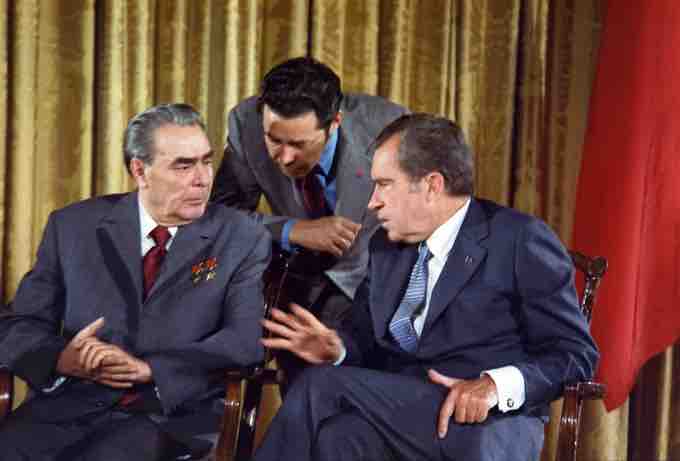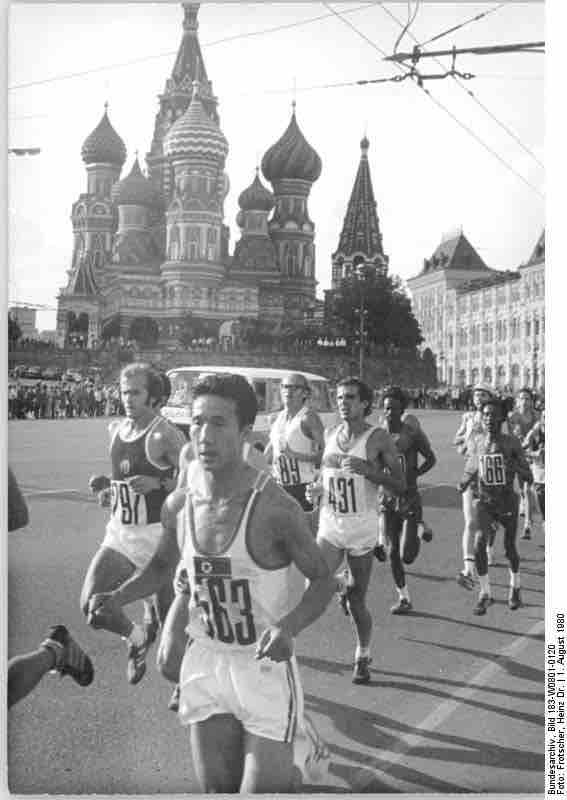Détente
Détente, French for "relaxation", is an international theory that refers to the easing of strained relations, especially in a political situation. The term is often used in reference to the general easing of relations between the Soviet Union and the United States in 1971, a thawing at a period roughly in the middle of the Cold War.
Treaties Toward Peace
The most important treaties of détente were developed when the Nixon Administration came into office in 1969. The Political Consultative Committee of the Warsaw Pact sent an offer to the West, urging to hold a summit on "security and cooperation in Europe". The West agreed and talks began towards actual limits to the nuclear capabilities of the two superpowers. This ultimately led to the signing of the treaty in 1972. This treaty limited each power's nuclear arsenals, though it was quickly rendered out-of-date as a result of the development of a new type of warhead. In the same year that SALT I was signed, the Biological Weapons Convention and the Anti-Ballistic Missile Treaty were also concluded.
A follow up treaty, SALT II was discussed but was never ratified by the United States. There is debate among historians as to how successful the détente period was in achieving peace. The two superpowers agreed to install a direct hotline between Washington DC and Moscow, the so-called "red telephone," enabling both countries to quickly interact with each other in a time of urgency. The SALT II pact of the late 1970s built on the work of the SALT I talks, ensuring further reduction in arms by the Soviets and by the US .

Nixon and Brezhnev
President Nixon and Premier Brezhnev lead in the high period of détente, signing treaties such as SALT I and the Helsinki Accords.
The Helsinki Accords and Human Rights in the USSR
The Helsinki Accords, in which the Soviets promised to grant free elections in Europe, has been seen as a major concession to ensure peace by the Soviets. The Helsinki Accord were developed by the Conference on Security and Cooperation in Europe, a wide ranging series of agreements on economic, political, and human rights issues. The CSCE was initiated by the USSR, involving 35 states throughout Europe.
Among other issues, one of the most prevalent and discussed after the conference was the human rights violations in the Soviet Union. The Soviet Constitution directly violated the declaration of Human Rights from the United Nations, and this issue became a prominent point of dissonance between the United States and the Soviet Union.
Because the Carter administration had been supporting human rights groups inside the Soviet Union, Leonid Brezhnev accused the administration of interference in other countries' internal affairs. This prompted intense discussion of whether or not other nations may interfere if basic human rights are being violated, such as freedom of speech and religion. The basic differences between the philosophies of a democracy and a single-party state did not allow for reconciliation of this issue. Furthermore, the Soviet Union proceeded to defend their internal policies on human rights by attacking American support of countries like South Africa and Chile, which were known to violate many of the same human rights issues.
Détente ended after the Soviet intervention in Afghanistan, which led to America's boycott in the 1980s Olympics in Moscow . Ronald Reagan's election in 1980, based on an anti-détente campaign, marked the close of détente and a return to Cold War tension.

1980 Moscow Olympics
After the Soviet invasion of Afghanistan, many countries boycotted the 1980 Olympic Games, held in Moscow. This photograph depicts Olympic runners in the 1980 games in front of Saint Basil's Cathedral in Moscow.